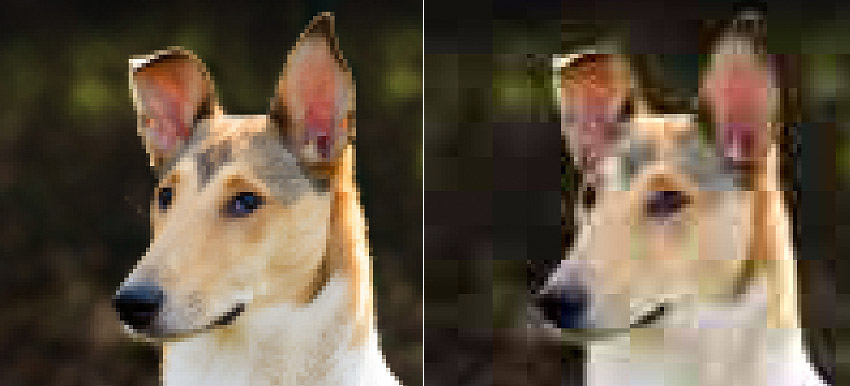New JPEG encoder from Google: Guetzli
Behind this somewhat strange name is a software that is supposed to be able to create 35% smaller JPG images with similar quality than other programs. Of course I had to try this out right away. The program code is available as open source and can be downloaded from GitHub.
To avoid any misunderstanding, this is not a new image format, but just a new way to compress images. The result is a normal JPG image that can be read by any software.
What does it mean? JPEG is a so-called lossy format, i.e. the image no longer corresponds to the original. Simplified you can say that by omitting certain information the file size is reduced. And the more you leave out, the smaller the file becomes. Of course, this has its price. The smaller the image, the more noticeable the effects of this reduction. These image errors are also called artifacts, which in extreme cases look like this:

The trick now is to leave out as much as possible without it being visible. Google uses a psychovisual model for this, which, similar to the mp3 format, leaves out the parts that our eye can't see anyway. Google has named this model Butteraugli. The developers obviously had a lot of fun at work :-)
Landscape photo
Now here is a sample photo. The resolution is 1280x854 pixels. The left image is saved with Photoshop at a quality of 95%. The right image was created by Guetzli with the default settings, which are also set to 95%.
At first glance, the two images look very similar. But on closer inspection, you'll notice that the Guetzli image has slightly less saturation.
For comparison, here are the durations and sizes of the images:
| Time (Seconds) | Size (KBytes) | Size (%) | |
|---|---|---|---|
| Photoshop | <1 | 1.177 | 100 |
| Guetzli | 175 | 582 | 49,5 |
In this case, the Guetzli file is only half the size of the Photoshop file. But while the Photoshop image is saved with practically no time delay, I have to wait much longer for the Guetzli image.
Here is the comparison of some details from the image:
Especially at the edges you can see that the Photoshop image has much less artifacts. With twice the file size, that's no surprise either. So what can we conclude from this comparison? Actually nothing at all! The number "95%" means something different for each program and is not a universal standard. Therefore I make a second comparison. Starting from the size of the Guetzli file, this time I save the photo in a quality so that the Photoshop file is the same size as the Guetzli file. In this case, that's at a quality of 75%. The generated image is then 588 KBytes in size.
Now the two images are much more similar. It is still noticeable that the Guetzli image has less saturation. You can see this especially clearly in the small chimney at the top center and the shutters at the bottom. I can't see a winner in the artifacts, though. In the case of the logo, the Guetzli encoder looks a bit better, but the mountain ridge has a bit fewer artifacts in the Photoshop encoder.
Studio photo
For a second test, I chose a studio photo.
For comparison again the duration and sizes of the images:
| Time (Seconds) | Size (KBytes) | Size (%) | |
|---|---|---|---|
| Photoshop | <1 | 314 | 100 |
| Guetzli | 344 | 693 | 220,8 |
Now this is quite a surprise. The Guetzli file is more than twice the size of the Photoshop file. I find that extremely exciting! Apparently, Google's algorithms are extremely optimized for "normal" photos and can't do anything at all with the large dark areas. In addition, the program needs almost 6 minutes for this photo. I have therefore spared myself a more precise comparison for this photo.
So what is my conclusion?
The new JPEG encoder is at best similarly good as Photoshop, but can also deliver significantly worse results. Basically, I would have to create both versions for each photo and then take the smaller file. Much too cumbersome. And it's very slow, too. All in all, Guetzli doesn't make sense for me yet. But maybe this will change in a future version. But it would be even better if a successor format would finally prevail, no matter if WebP, JPEG-XR, BPG or maybe something completely new.